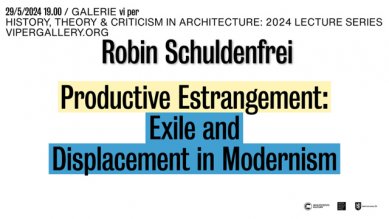
Robin Schuldenfrei: Productive Estrangement - lecture at Gallery VI PER
Exilio y Desplazamiento en el Modernismo
Galerie VI invites you to a lecture by Robin Schuldenfrei from the series History, Theory & Criticism in Architecture.
In the current times of displaced people and fluctuating seismic events, the mid-century presents an instructive moment when much was at stake. As a consequence of migration and displacement, exile influenced the changing direction of modernism in art, architecture, and design. Exile and the effects of alienation that accompanied it introduced radically different situations into the practice of artists such as Bauhaus teachers and artists Anni and Josef Albers, Herbert Bayer, and architects Walter Gropius, Marcel Breuer, and Ludwig Hilberseimer, leading to remarkable new works in architecture, art, and design.
By examining the interwar period, the period of World War II, and the post-war era, it will be argued that modernism in art, design, and architecture was shaped by diverse ideas, aesthetics, and new materials linked to the seismic shift of events that caused the mass dislocation of people in general and the migration of key members of the artistic avant-garde. This lecture will address how defamiliarization brought about productive change through the connection of artists and designers committed to securing a new, modern way of life through modern means. The innovative visions and designs they created drew from both the places they left and their interactions with the new places of exile. This process of exile and alienation was to change the course of the development of modernism.
Dr. Robin Schuldenfrei is a professor at the Courtauld Institute of Art, University of London. She specializes in the history of modern architecture with a focus on materiality and object. She is interested in broad questions – both theoretical and practical – regarding how discourses and practices of design are shaped by the cultural and theoretical critiques of the given period. In her research and teaching, she focuses on the subjectivity of objects, their political effects, and social impact. Her latest book is Objects in Exile: Modern Art and Design across Borders, 1930–1960 (2024). Among her previous publications are Luxury and Modernism: Architecture and the Object in Germany 1900–1933 (2018), as well as numerous articles, essays, and four edited volumes, including: Iteration: Episodes in the Mediation of Art and Architecture; Atomic Dwelling: Anxiety, Domesticity, and Postwar Architecture; and in collaboration with Jeffrey Saletnik, Bauhaus Construct: Fashioning Identity, Discourse, and Modernism. Schuldenfrei has received various grants from the Andrew W. Mellon Foundation, Graham Foundation, Society of Architectural Historians, and Deutscher Akademischer Austausch Dienst (DAAD). She is currently working on a new book about the material politics of global objects.
In the current times of displaced people and fluctuating seismic events, the mid-century presents an instructive moment when much was at stake. As a consequence of migration and displacement, exile influenced the changing direction of modernism in art, architecture, and design. Exile and the effects of alienation that accompanied it introduced radically different situations into the practice of artists such as Bauhaus teachers and artists Anni and Josef Albers, Herbert Bayer, and architects Walter Gropius, Marcel Breuer, and Ludwig Hilberseimer, leading to remarkable new works in architecture, art, and design.
By examining the interwar period, the period of World War II, and the post-war era, it will be argued that modernism in art, design, and architecture was shaped by diverse ideas, aesthetics, and new materials linked to the seismic shift of events that caused the mass dislocation of people in general and the migration of key members of the artistic avant-garde. This lecture will address how defamiliarization brought about productive change through the connection of artists and designers committed to securing a new, modern way of life through modern means. The innovative visions and designs they created drew from both the places they left and their interactions with the new places of exile. This process of exile and alienation was to change the course of the development of modernism.
Dr. Robin Schuldenfrei is a professor at the Courtauld Institute of Art, University of London. She specializes in the history of modern architecture with a focus on materiality and object. She is interested in broad questions – both theoretical and practical – regarding how discourses and practices of design are shaped by the cultural and theoretical critiques of the given period. In her research and teaching, she focuses on the subjectivity of objects, their political effects, and social impact. Her latest book is Objects in Exile: Modern Art and Design across Borders, 1930–1960 (2024). Among her previous publications are Luxury and Modernism: Architecture and the Object in Germany 1900–1933 (2018), as well as numerous articles, essays, and four edited volumes, including: Iteration: Episodes in the Mediation of Art and Architecture; Atomic Dwelling: Anxiety, Domesticity, and Postwar Architecture; and in collaboration with Jeffrey Saletnik, Bauhaus Construct: Fashioning Identity, Discourse, and Modernism. Schuldenfrei has received various grants from the Andrew W. Mellon Foundation, Graham Foundation, Society of Architectural Historians, and Deutscher Akademischer Austausch Dienst (DAAD). She is currently working on a new book about the material politics of global objects.
The English translation is powered by AI tool. Switch to Czech to view the original text source.

0 comments
add comment











